Edie Melson's Blog, page 63
January 24, 2024
You’re Never Too Old to Write

by Henry McLaughlin @RiverBendSagas
My writing career began in my early forties when I had the brilliant idea I could write a novel. I’ve been a reader all my life. I think I was born reading a Batman comic book. I remember thinking, how hard could writing be? You just put one word after another, right?
So, I dabbled, as I call it, for about 10 years. I rewrote the first chapter probably 15 times.
Then I got serious. I attended conferences. Read books and magazines on the craft. Joined writers groups. Signed up for the Christian Writers Guild online courses.
I made the time to learn the craft and to practice, practice, practice. Which is another word for revise, revise, revise.
I entered my novel in a contest. Now with an entirely different first chapter. And I won the contest!! And my first novel was published when I was 63 years old.
I don’t share this to brag on myself. All I did was type words. God gave the inspiration and the ideas.
I share it to encourage those of you with graying hair and cranky bodies to continue to pursue your writing dreams. And turn the care of it over to God.
I recently attended a writers conference. I was amazed to see a great number of the attendees were my age or older. Many have been writing for years and are still seeking to publish their first book.
Don’t ignore small beginnings. Many writers started in some other forum before they looked to write a book. Some wrote church curriculum, some were journalists, other wrote short stories or poetry. Magazine articles and church newsletters were the route many took. Some, like me, jumped directly into writing novels because that was the burning desire in our hearts.
The Age When Some Authors Published Their First Book:
~ Laura Ingalls Wilder was 65.~ Frank McCourt was 66 when he published his first book: Angela’s Ashes. And it won the Pulitzer Prize.~ Harriet Doerr published Stones of Ibarra when she was 54 and it won the National Book Award.~ Millard Kaufman, the creator of Mr. Magoo, didn’t publish his first novel, Bowl of Cherries, until he was 90.~ British author Mary Wesley published her first children’s book when she was 57 and her first adult novel when she was 71.
So don’t let the date on your driver’s license frighten you. Ignore the gray-haired face in the mirror and the joints that aren’t as supple as they once were. Ignore the voices in your head that tell you you’re too old to start something new, especially to write.
And sometimes these voices are outside your head in the guise of well-meaning friends and family. Ignore them too. And remind them that if they aren’t nice to you, you’ll put them in your book. And not necessarily in a good way. Anne Lamott is quoted as saying, “If my family didn’t want me to write about them, they should have been nicer to me.”
If you want to write, write. Learn the craft. Read about writing. Join writers groups. Attend conferences. Find a mentor.
At our ages, we have a wealth of stories to tell. Stories that will teach, enlighten, encourage, and entertain. Stories that will inspire and bring people closer to God and to what they are called to be. Our wisdom and insight can impact so many, they need to be shared. The world needs to hear our stories. It needs to hear your stories.
Let me close with this. Before my first novel was published, I asked a few friends and fellow writers to read the manuscript and give me feedback to help me make the story better.
One reader pointed out one scene and said, “Whatever you do, don’t take this out of the book. It brought me closer to God.”
In my heart, God said, “If your book never gets published, it still achieved my purpose. It brought her closer to me.”
Keep writing.
TWEETABLEYou're Never too Old to Write insight from Henry Mclaughlin (@RiverBendSagas) on @EdieMelson (Click to Tweet)
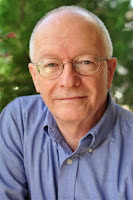 Henry’s debut novel, Journey to Riverbend, won the 2009 Operation First Novel contest.
Henry’s debut novel, Journey to Riverbend, won the 2009 Operation First Novel contest.Henry edits novels, leads critique groups, and teaches at conferences and workshops. He enjoys mentoring and coaching individual writers.
Connect with Henry on his BLOG, TWITTER and FACEBOOK.
Published on January 24, 2024 22:00
January 23, 2024
Tips to Make Sure Your Writing Voice is Authentically YOU!
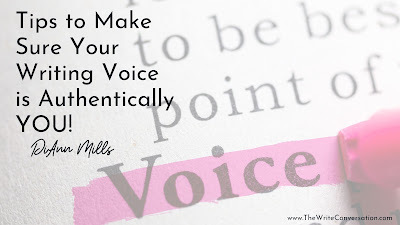
by DiAnn Mills @DiAnnMills
A writer’s authentic voice ranks as a priority for today’s reader. These people value credibility in a world that is often projecting questionable information. Trust must be earned and if we are to secure and keep our reader’s attention, then we must destroy any barriers.
If you’ve labored over any of the following questions, this article may help you perfect your authentic writer’s voice.Do you write like you talk?Do you imitate bestselling writers?Are you laboring over your voice, so it fits your genre?Do you wrestle with the difference between the character’s voice and the writer’s?When you read your writing, do you sound like a stranger? Someone foreign?Perfecting Your Writer's Voice
Rule Number One
A writer’s literary voice is the writer’s personality. We are unique individuals who think, act, talk, and write according to our range of introvert and extrovert traits. And there’s more! Voice includes faith, career, culture, health, habits, birth order, education, environment, external influences, life experiences, and a host of other factors.
Rule Number Two
An authentic writer’s voice is real, fresh, raw, and intimate. Writers who long to connect, influence, and/or entertain readers balance transparency with the best way to build a strong relationship.
Rule Number Three
Authenticity in a writer’s voice happens when the writer forgets about how he/she wants to or should sound morphs into how the writer does sound. The process doesn’t neglect proper grammar, punctuation, writing suggestions, or easy-to-understand conversation. Instead, it takes into consideration the guidelines and chooses when and how to make the manuscript personable.
Rule Number Four
Simply write. Write some more. Keep writing. Be clear and concise, and if in doubt, request those who know us critique what we’ve written.
Rule Number Five
Fiction and nonfiction have distinct purposes.
Nonfiction relays information about real happenings and people. A writer uses his/her voice to share truth through personality. Fiction uses distinct characters who have their uniqueness, but the voice is a blend of the character and how the writer interprets the character’s life experiences and role in the story.
Our goal as writers is for readers to read our work and know instinctively who has written the manuscript. When we receive feedback that says, “I knew you’d written the piece, because it sounded like your voice.” Or “I read the paragraph and felt you and I were talking whlle sharing a cup of coffee. Then you have achieved success.
Have you achieved an authentic writer’s voice?
TWEETABLETips to Make Sure Your Writing Voice is Authentically YOU! @DiAnnMills on @EdieMelson (Click to Tweet)
 DiAnn Mills is a bestselling author who believes her readers should expect an adventure. She creates action-packed, suspense-filled novels to thrill readers. Her titles have appeared on the CBA and ECPA bestseller lists; won two Christy Awards; and been finalists for the RITA, Daphne Du Maurier, Inspirational Readers’ Choice, and Carol award contests.
DiAnn Mills is a bestselling author who believes her readers should expect an adventure. She creates action-packed, suspense-filled novels to thrill readers. Her titles have appeared on the CBA and ECPA bestseller lists; won two Christy Awards; and been finalists for the RITA, Daphne Du Maurier, Inspirational Readers’ Choice, and Carol award contests. She is the former director of the Blue Ridge Mountain Christian Writers Conference, Mountainside Marketing Retreat, and Mountainside Novelist Retreat with social media specialist Edie Melson. Connect here: DiAnnMills.com
Published on January 23, 2024 22:00
January 22, 2024
Dipping the Quill Deeper: Write Like John. Edit Like Estienne?
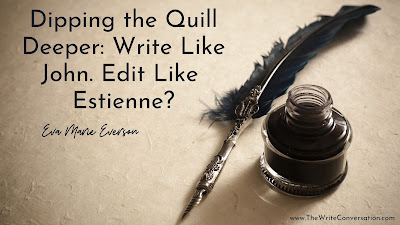
by Eva Marie Everson @EversonAuthor
Jesus wept.
Have you ever stopped to really think about that tiny verse of Scripture found in the book of John (11:35) or why it stands as the “shortest verse of the Bible”? I think I may know, but I’ve had to “noodle” on it for a while.
When John wrote his recording of the gospel message, he didn’t separate the work into chapter and verse. He just wrote. In the 13th century (think about that . . . the 13th century!), Stephen Langton, the archbishop of Canterbury, separated the sentences and paragraphs into chapters. Two hundred years later, Rabbi Mordecai Nathan divided the Old Testament scriptures and then, another hundred years after that, Robert Estienne separated the New Testament into verses.
So, what made Estienne think to take those two words—Jesus wept—and separate them from the rest?
The Queen of Two-word Paragraphs
Years ago, an editor said to me, “You’re the queen of two-word paragraphs.”
Really, now?
This was meant to be a compliment and I took it as such. But, like many of you, I remember the adage taught in 7th grade English & Grammar. “Paragraphs must be comprised of at least three to five sentences that run along the same thought.”
Two-word sentences were typically frowned upon in those days, so imagine if I had turned in an essay with a two-word paragraph. I would have been told to make corrections and, knowing me, I would have brought the verse in John to the table for debate. And, I could argue, at least Estienne made sure of a noun and verb.
The purpose of the two-word (or three-word) paragraph is to force the reader to stop and think. To grasp at the emotion therein. Just this past week, I wrote a paragraph in my current WIP with only three words.
[Name here*] was dead.
I want the reader to gasp. To feel the pain of this particular character’s sudden death. I want it to hit the reader as hard as it hit the POV character. So I set it apart.
And I believe this is why Estienne did the same. Jesus’ friends, Mary and Martha, were hurting. Gut-wrenching hurt. Their beloved brother was dead and had been for days. Both sisters believed that had Jesus been there, Lazurus would not have died. Even though Jesus expressed to Martha that Lazurus would “rise again” (11:23), she misunderstood His promise. Jesus then assured her with, “He who believes in me will live, even though he dies; and whoever lives and believes in me will never die.” Then He asked a most profound question, “Do you believe this?”
In other words, do you believe Me?
John tells us that in seeing Mary cry (the Greek John used here denotes wailing) and those who were with her doing the same, He became “deeply moved in spirit and troubled (11:33c, emphasis mine).
One cannot stand in the midst of such pain and heartache, in such overall emotion, without feeling it, too. Jesus also knew He was running out of time for those who heard His teachings to get His teachings. To understand Who He was and is and always shall be. That He alone has control over life eternal when we trust—when we believe—in Him.
When we believe Him.
And so He wept. And this is not the same word as the one John used before. This is weeping, which I believe comes from somewhere even deeper than the grief associated with death. It’s simply altogether on another scale. John made a special effort to drive a specific point. Then, centuries later, Estienne pulled those two words away from the rest and said, “Let’s drive it even further.”
Do You Do the Same?
Bible lesson aside, do you do the same with your work?
Years ago, I read a novel with a final scene that nearly crushed me—as it well should have. I had gone to bed but, unable to put the work down, I propped up with a few pillows, had a low light nearby, and read while my husband slumbered beside me. As I came to the final paragraphs, I slipped out of bed and went to a far room in the house because I knew that when the crying began, it wasn’t going to be pretty.
Now that’s some good writing.
When you are writing or editing your manuscripts, do you look for those impact lines on the reader? Fiction or nonfiction, books or articles, your goal should be to move those who read your work. Sometimes, far from their comfort zones. We want our readers to gasp and sigh, to laugh and cry—blubber, if necessary—at all the appropriate times. Therefore, choose your words carefully. Separate your work in just the right places.
Write like John.
Edit like Estienne.
------------------
*I’ve deleted the name so as not to give anything away.
TWEETABLEDipping the Quill Deeper: Write Like John. Edit Like Estienne? @EversonAuthor on @EdieMelson (Click to Tweet)
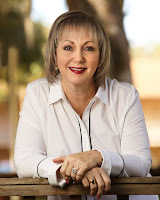 Eva Marie Everson is the CEO of Word Weavers International, the director of Florida Christian Writers Conference, and the contest director for Blue Ridge Mountains Christian Writers Conference. She is the multiple award-winning author of more than 45 books and countless articles and blogposts. She is also an award-winning speaker and a Bible teacher, a recipient of the Yvonne Lehman Award (2022), the AWSA Lifetime Achievement Award (2022), and the ECPA Gold Medallion (2023).
Eva Marie Everson is the CEO of Word Weavers International, the director of Florida Christian Writers Conference, and the contest director for Blue Ridge Mountains Christian Writers Conference. She is the multiple award-winning author of more than 45 books and countless articles and blogposts. She is also an award-winning speaker and a Bible teacher, a recipient of the Yvonne Lehman Award (2022), the AWSA Lifetime Achievement Award (2022), and the ECPA Gold Medallion (2023). Eva Marie is often seen at writers conferences across the States. She served as a mentor for the Jerry B. Jenkins Christian Writers Guild and taught as a guest professor at Taylor University in 2011. She and her husband make their home in Central Florida where they enjoy their grandchildren. They are owned by a cat named Vanessa.
Eva Marie's latest book, THE THIRD PATH JOURNAL, is a companion to her book, the AWSA Golden Scroll Book of the Year, THE THIRD PATH. The Third Path looks at 26 of the questions God asked in the Bible, then makes them personal to the reader. The premise of the book is currently her most asked for continuing workshop at writers conferences.
Published on January 22, 2024 22:00
January 21, 2024
5 Tips to Effectively Juggle Writing Projects

by Ane Mulligan @AneMulligan
I can’t juggle. Oranges, lemons, it doesn’t matter. They all fall to the floor. I tried grapes, erroneously thinking since they are smaller, I could catch them easier. Wrong. Believe me, I’ve practiced, until the dog started chasing after the grapes. Those are bad for pups, so I gave up my bid for a career in the circus to focus on something I can juggle.
Writing projects.
I discovered working either one feeds my muse for the other. And all three are works of fiction—one is a script, one a novella project, and the third, a full-length novel. When I’m working on the script, and my muse twangs an idea for a good plot twist for the novel, I jot down a note and continue writing the script.
My “normal” is one writing project at a time. That doesn’t include blog articles. I can write blog posts or magazine articles in the midst of fiction. But when I first added a second fiction project to my already full schedule, I wondered if I could keep the characters straight and in their own world.
Besides the writing, there is research, editing, and plotting. I had to keep those separated for each project. But I did it, much to my surprise. Even when I tossed a fourth project into the juggling.
5 Juggling Tips for Writers
1. Keep simultaneous projects different if possible. I’m writing a script for an old-fashioned medicine show. It’s silly, funny, filled with alliteration and giggles. The novella is pure contemporary romance, and the novel is historical women’s fiction set in 1929-30. That gives me plenty of difference to keep them out of each other’s worlds.
2. Have character photos and a bullet list of personality traits handy. Using an actor’s resume as a pattern, I printed out a character’s photo with their main personality profile items on the back: past wound, the lie they believe, their GMCs and a few other defining facts about them.
3. Assemble your cast before beginning that project. While I write in Scrivener and keep everything there, I have a physical story board beside my writing chair, for each project. I use small bulletin boards, and switch them for each project. Having their faces before me grounds me in their story.
4. Have some time of activity between projects. Fold laundry, empty the dishwasher, take a walk. Anything to close the door on the previous work before starting the next one. That allows your mind turn off one project and prepare to switch between the stories.
5. Set your hours so you have specific amounts of time to work on each project.
Don’t forget to give yourself grace to change your schedule when life interrupts. That simple phrase, give yourself grace, I learned from my good friend Edie Melson. It changed my life, and it will yours too.
TWEETABLE5 Tips to Effectively Juggle Writing Projects from @AneMulligan on @EdieMelson (Click to Tweet)
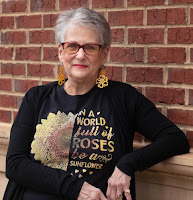 Ane Mulligan lives life from a director’s chair, both in theatre and at her desk, creating novels. Entranced with story by age three, at five, she saw PETER PAN onstage and was struck with a fever from which she never recovered—stage fever. One day, her passions collided, and an award-winning, bestselling novelist immerged. She believes chocolate and coffee are two of the four major food groups and lives in Sugar Hill, GA, with her artist husband and a rascally Rottweiler. Find Ane on her website, Amazon Author page, Facebook, Instagram, Pinterest, The Write Conversation, and Blue Ridge Conference Blog.
Ane Mulligan lives life from a director’s chair, both in theatre and at her desk, creating novels. Entranced with story by age three, at five, she saw PETER PAN onstage and was struck with a fever from which she never recovered—stage fever. One day, her passions collided, and an award-winning, bestselling novelist immerged. She believes chocolate and coffee are two of the four major food groups and lives in Sugar Hill, GA, with her artist husband and a rascally Rottweiler. Find Ane on her website, Amazon Author page, Facebook, Instagram, Pinterest, The Write Conversation, and Blue Ridge Conference Blog.
Published on January 21, 2024 22:00
January 20, 2024
A Time for New in the Writing Life
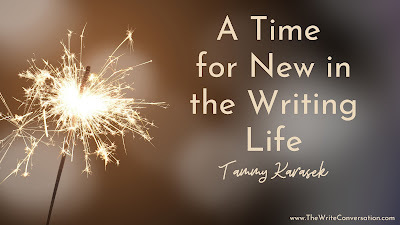
by Tammy Karasek @TickledPinkTam
There is a time for everything, and a season for every activity under heaven… Ecclesiastes 3:1 NIV
January always brings this verse to my mind when we begin a new year. A dear friend read this passage at my father’s funeral in January 1994. Though it was a sad day, this encouraged me that this was a season in my life, and changes would come. And they have.
When I flip the calendar to January, I’m reminded it’s a time for all things new, a season of change, and maybe resolutions or goal setting. I look forward to the great new things that will happen in the coming year. Setting goals and writing them down in my planner makes me giddy. Adding fun events make me smile. Marking deadlines for projects inspire me to stay on track.
All of us can set personal goals to make our writing more productive, to be kind and helpful to our fellow writers and to show more Jesus in all that we write. But do we strive to achieve those goals? Or like that new gym membership, they become forgotten before February’s calendar page is turned.
It’s up to each of us to make that choice to follow through. Will you set a goal this year to apply yourself more to your writing? Will you resolve to be on time at your desk, ready to do what is needed that day? Will you look for ways to engage with your fellow writers in a thoughtful and encouraging way?
I’d mulled these specific thoughts for myself regarding my writing this year and written down a few goals. Then I read a scripture passage one morning, and found a new verse to apply to my writing goals for this year:
He who was seated on the throne said, ‘I am making everything new! Then he said, ‘Write this down, for these words are trustworthy and true.Revelation 21:5 NIV
I realize this passage is referring to the New Jerusalem, but it struck me that He is making everything new for me as well in this coming year regarding my writing journey. There are many changes on the horizon for me in my writing path. Some good, some—just will be. Maybe there will be changes for you as well. But this passage gave me extra wind in my sails, so to speak. I was greatly encouraged and grabbed it for myself and did as it said—I wrote it down as words that are trustworthy and true since they are from God.
Will this be your year for the gospel to shine brightly through your written words for others to see Him? Will you encourage your fellow writers to do the same? I pray you write it down that the Lord is making all things new and you resolve to grab this season for your writing and give it your best.
There really is a time for everything and He will make new things for us all the time.
We’d love to hear your take on this topic of newness in your writing for this upcoming year. Please share something new you’re looking forward to in your writing journey.
TWEETABLEA Time for New in the Writing Life from author @TickledPinkTam on @EdieMelson (Click to Tweet)
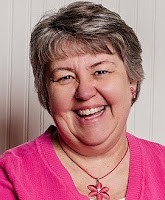 Tammy Karasek uses humor and wit to bring joy and hope to every aspect in life. Her past, filled with bullying and criticism from family, drives her passion to encourage and inspire others and give them The Reason to smile. She’s gone from down and defeated to living a “Tickled Pink” life as she believes there’s always a giggle wanting to come out! A writer of Romance—with a splash of sass. She’s also The Launch Team Geek helping authors launch their books and also a Virtual Assistant for several best-selling authors. Don't miss her recent book, LAUNCH THAT BOOK, just released in November.
Tammy Karasek uses humor and wit to bring joy and hope to every aspect in life. Her past, filled with bullying and criticism from family, drives her passion to encourage and inspire others and give them The Reason to smile. She’s gone from down and defeated to living a “Tickled Pink” life as she believes there’s always a giggle wanting to come out! A writer of Romance—with a splash of sass. She’s also The Launch Team Geek helping authors launch their books and also a Virtual Assistant for several best-selling authors. Don't miss her recent book, LAUNCH THAT BOOK, just released in November. Her work was also published in a Divine Moments Compilation Book—Cool-inary Moments. She’s also the Social Media Manager for the Blue Ridge Mountains Christian Writers Conference, Founding President and current Vice-President of ACFW Upstate SC, and Founding President of Word Weavers Upstate SC. She’s a writing team member for The Write Conversation Blog, Novel Academy, MBT Monday Devotions, The Write Editing and more. Connect with Tammy at HTTPS://WWW.TAMMYKARASEK.COM.
Published on January 20, 2024 22:00
January 19, 2024
Is My Idea Good for a Nonfiction Book or Something Shorter

by Edie Melson @EdieMelson
Sometimes it’s hard to know where a writing idea truly fits. It may sound good, but it’s critical that we have the tools to evaluate whether the idea is book length or needs some tweaking. Today I'm going to walk you through the steps I use to evaluate whether an idea is good for a book-length project or better suited to something shorter.
The Process of Evaluating a Book Idea
First, your book idea must answer these questions:Who is the book for? Who is your audienceWhat ageWhat are their circumstances
What problem does the book answer?Every reader picks up a book and at least subconsciously asks, “What’s in it for me?”
Is this a niche audience or more mainstream?Can you prove this audience exists?Are you connected to this audience already?Do you know how to connect with this audience?
Is the market flooded with this idea?This doesn’t mean don’t write it. It may mean you need to tweak it to have a unique twist
What are the current issues this idea addresses?Look for current trends.WARNING: Don’t write to trends, but look for relevance to today’s audience
Why are you the right person to write this book?Do you have expertise Do you have experience
Once you’ve answered these questions, begin exploring if your idea is long enough for a book
Second, answer these questions:
Does your book have a narrative?Just like in fiction, nonfiction has an arc. This means there’s a starting point and a resolution. This is how that worked in my book, Soul Care When You’re WearyTriageRediscovering PeaceReconnecting with Prayer PlayLetting GoMoving on to Joy
Is your book complex enough? Do you have enough ideas for 40 – 50,000 words
Is there a unifying theme?
Once you’ve checked all these boxes, it’s time to move on to the next set of questions/considerations:
How will you sell your book once it’s publishedAre you interested in self-publishing? Why or Why not?Are you a speaker or a public figure with exposure to a lot of people who will buy your book. Just FYI, an average self-pub author can sell about 200 books a year. Do you have a compelling reason for getting the book out immediately?Is traditional publishing your dream?
How big is your platform?A tiny or nonexistent platform can be a HUGE stumbling block to traditional publishing.Even with self-pub, you still need a platform to get your book exposed to readers (there are approximately 1 billion UPC codes on Amazon right now)Look at your platform like a publisher and or agent would:Social media platforms and numbersBlog numbersGuest post and article numbersSubscriber listsBorrowed platforms
If you’re unsure about how well your book idea would work as a book, begin to write articles or blog posts or even social media updates about the topic. This will do several things: It will help solidify the topic and organize your ideasIt will prove to editors/agents that you have a viable topicIt will prove there is a market for your idea
Warnings to heed:1. Don’t make the mistake of writing the book for yourself. Telling your story may be cathartic, but every book is written for the READER, not the WRITER2. Don’t write the book and THEN build a platform. Connect with your audience now and while you’re writing the book. This will help you write a better book and make it easier to sellDon’t make it too long. Nonfiction books are shorter than fiction. 20,000 is the short end and 60,000 is about the longest. There are always exceptions to the rule, but they better be GREAT exceptions or they won’t flyThese are the things I consider when I evaluate an idea for myself or for someone I'm coaching. Now it's your turn, what questions and thoughts do you have? Be sure to leave your comments in the section below!
Don't forget to join the conversation!Blessings,Edie
TWEETABLEIs My Idea Good for a Nonfiction Book or Something Shorter? @EdieMelson (Click to Tweet)
 Edie Melson is a woman of faith with ink-stained fingers observing life through the lens of her camera. No matter whether she’s talking to writers, entrepreneurs, or readers, her first advice is always “Find your voice, live your story.” As an author, blogger, and speaker she’s encouraged and challenged audiences across the country and around the world. Her numerous books reflect her passion to help others develop the strength of their God-given gifts and apply them to their lives. Connect with her on her website, through Facebook, Twitter and Instagram.
Edie Melson is a woman of faith with ink-stained fingers observing life through the lens of her camera. No matter whether she’s talking to writers, entrepreneurs, or readers, her first advice is always “Find your voice, live your story.” As an author, blogger, and speaker she’s encouraged and challenged audiences across the country and around the world. Her numerous books reflect her passion to help others develop the strength of their God-given gifts and apply them to their lives. Connect with her on her website, through Facebook, Twitter and Instagram.
Published on January 19, 2024 22:00
January 18, 2024
A Proverb for Writers

by Crystal Bowman
God’s Word is alive and active. It speaks to us no matter what season of life we are in or whatever circumstances we face. As God speaks to us through His Word, He offers hope, guidance, wisdom, and encouragement for our everyday lives.
I recently read a verse in Proverbs that spoke loud and clear to me as a writer: “The person who gets wisdom is good to himself. And the one who has understanding will succeed” Proverbs 19:8, ICB.
So, what does this verse mean to writers? Plenty!
Acquire wisdom:Read books or articles about writing and publishing. Read books or articles about grammar, voice, and POV. Read books in the genre that interests you. Seek wise counsel. Contact writers who have gone before you and ask questions. Explore their websites and follow them on their social media.Pray and ask God to direct your writing life and show you where your writing belongs. It may be a book, magazine article, or devotion. Be open to wherever He leads.
Gain understanding:Learn all you can about the writing and publishing process. Attend writers’ conferences to take classes and meet with authors, agents, and editors.Explore publishers’ websites and read their submission guidelines.Work with a coach or mentor to professionally prepare your manuscript and proposal before submitting it to a publisher.Understand that the publishing industry is always changing, so be sure to access the most current information. Learn as much as you can about the business side of writing. When I began writing thirty years ago, social media and platform did not exist. Today they do.
The benefits of wisdom and understanding:
Did you notice the positive messages tucked inside this short Proverb? Writers who gain wisdom are good to themselves. Gaining wisdom is beneficial for all areas of our lives, including writing.
Having understanding will help writers to succeed. The more you understand about the writing and publishing process, the more you increase your chances of getting published. Success is not about becoming a best-selling author (though that may happen). Rather, it’s about reaching your goal of being published so others can be inspired by your words.
A Challenge for Writers:
We recently flipped the calendar to begin a new year. What writing goals have you set for this year and what steps are you taking to reach those goals? Why not make this proverb one of your focus verses for 2024? Gain wisdom and understand—and be good to yourself!
TWEETABLEA Proverb for Writers from author Crystal Bowman on @EdieMelson (Click to Tweet)
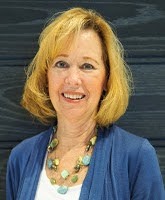 Crystal Bowman is an award-winning, bestselling author of more than 100 books for children and families. She also writes lyrics for children’s piano music and is a monthly contributor to Clubhouse Jr. Magazine, Arise Daily, and Christian Children's Authors. She enjoys coaching children's writers as well as teaching at writers conferences. When she is not writing or speaking, she likes going for walks and spending time with her huggable grandkids. She and her husband live in Michigan and Florida and try to avoid snowstorms.
Crystal Bowman is an award-winning, bestselling author of more than 100 books for children and families. She also writes lyrics for children’s piano music and is a monthly contributor to Clubhouse Jr. Magazine, Arise Daily, and Christian Children's Authors. She enjoys coaching children's writers as well as teaching at writers conferences. When she is not writing or speaking, she likes going for walks and spending time with her huggable grandkids. She and her husband live in Michigan and Florida and try to avoid snowstorms.WWW.CRYSTALBOWMAN.COMWWW.FACEBOOK.COM/CRYSTAL.BOWMANWWW.FACEBOOK.COM/CRYSTALJBOWMANWWW.INSTAGRAM.COM/CRYSTALBOWMANAUTHOR
Published on January 18, 2024 22:00
January 17, 2024
Navigating Amazon’s New 3 Category Limit: A Step-by-Step Guide for Authors
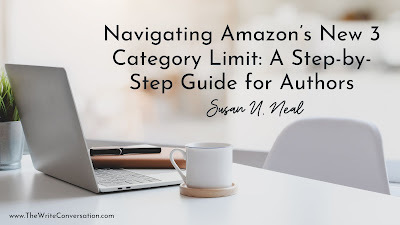
by Susan U. Neal RN, MBA, MHS @SusanNealYoga
Amazon's category system underwent significant changes recently. In this detailed article, we'll thoroughly examine these category alterations and provide actionable guidance on how you can effectively navigate and optimize your use of Amazon's revised category structure. Previously, authors could select up to ten Amazon categories to place their books into. However, in June 2023, Amazon made a major shift and implemented a new system that limits authors to choosing only three categories for each book.
With this change the category selection process is now even more vital. Authors must put far greater thought and precision into the process. To guarantee you make the most of your limited category options, follow this comprehensive, step-by-step methodology.
Conduct In-Depth Research on Potential Categories
The first critical step is to extensively research and create a list of potential book categories to choose from. Given the new constraint of just three categories, your selections need to be made much more meticulously. To assist with this process, use tools like Publisher Rocket to help optimally identify and analyze your category options. As a reminder, CAN/CIPA members receive a 30 percent discount on Publisher Rocket at CIPA.Podia.com .
Niche Down as Much as Possible into Subcategories
Selecting the right categories can be an extremely challenging undertaking, so it's absolutely essential you niche down as far as possible into subcategories with less competition. Rather than always opting for the largest, most competitive categories, shift your focus to pinpointing less competitive categories where your book is more likely to stand out and succeed. Getting your book ranked on one of Amazon's prestigious Bestseller Lists is a major goal for any author.
Choose a category where you need fewer book sales to rank high in that category. For example, the Amazon category, Books > Religion & Spirituality > Worship & Devotion requires 105 book purchases in a day to rank #10 in this category’s Bestseller List. Whereas you only need 16 book purchases to rank #10 in the category, Books > Children's Books > Religions > Christianity > Devotional.
Now you may encounter overlapping or duplicate categories, this redundancy isn't necessarily problematic. But it is new. Previously Amazon did not have duplicate categories. You don’t want to choose two categories that are redundant, so you need to know which ones duplicate each other. Publisher Rocket tells you if a category is a duplicate.
A sizeable number of duplicate categories exist on Amazon—approximately 54 percent according to Kindlepreneur.com research. If you choose 2-3 duplicate subcategories among your three selections, you're essentially only selecting one category.
Beware of Deceptive "Ghost Categories"
Another problematic issue arising from Amazon's category revisions is the surfacing of deceptive "ghost categories." These categories do not display a list of bestselling books, so they are completely invisible to customers browsing categories on Amazon. A staggering 27 percent of the categories available to select in Kindle Direct Publishing (KDP) fall into this practically useless "ghost category" bucket, offering authors no tangible benefit. Fortunately, Publisher Rocket now provides a useful feature that identifies these ghost categories to avoid.
Furthermore, it's imperative to note that Amazon retains full discretion to dictate the final number of categories your book is placed into. Even if you choose a specific category as one of your three selections, there is no guarantee Amazon will actually put your book into that category. Kindlepreneur's analysis found instances where Amazon added books to extra categories authors did not pick. Ensure your book legitimately fits the categories you select by choosing some the categories keywords that are associated with it. If Amazon sees your book includes keywords that are specific for that category, then they will most likely keep your book in the category you chose. Publisher Rocket provides a list of keywords that Amazon identifies as specific for each category, which is helpful.
Amazon's approach is centered on optimizing the overall customer experience. Their terms of service state, "We reserve the right to change the categories of a book at any time to ensure a positive customer service experience. The categories you add and the categories shown online may not always match. Your book may be added to additional categories or different categories to improve the customer service experience."
Given this provision, precision in your category picks is more critical than ever. Authors must be as specific and accurate as possible when making their crucial category selections. This is essential to ensure their books are positioned optimally into the categories that truly match their content and target audience.
Utilizing Tools and Adaptability
Amazon's recent category changes present new challenges for authors, but also open up opportunities for visibility if navigated strategically. The key is precision. Conduct detailed research, niche down into subcategories, and avoid pitfalls like duplicates and ghost categories. Leverage tools to identify keywords and analyze competition. With a methodical approach, it's possible to make every one of your three category selections count toward optimizing your book's Amazon presence.
Though Amazon's category overhaul requires adjustment, authors who take the time to understand the new landscape can position their books for success. Implement a step-by-step process when selecting categories to ensure you maximize visibility. The new restrictions demand more research, but niche subcategories present less competition. With strategic category picks, your book can flourish with the right targeted exposure to readers. Adaptability and utilizing the right tools will enable you to thrive with Amazon's category changes.
TWEETABLENavigating Amazon’s New 3 Category Limit: A Step-by-Step Guide for Authors, @SusanNealYoga on @EdieMelson (Click to Tweet)
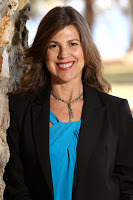 Susan U. Neal, RN, MBA, MHS: Susan’s mission is to improve the health of the body of Christ. She has her RN and MBA degrees, as well as a master’s in health science. She is a CERTIFIED HEALTH AND WELLNESS COACHwith the American Association of Christian Counselors. She published five books, the Selah award winner 7 STEPS TO GET OFF SUGAR AND CARBOHYDRATES, CHRISTIAN STUDY GUIDE FOR 7 STEPS TO GET OFF SUGAR AND CARBOHYDRATES, HEALTHY LIVING JOURNAL, SCRIPTURE YOGAa #1 Amazon best-selling yoga book, and YOGA FOR BEGINNERSwhich ranked #3. She published two sets of Christian Yoga Card Decks and two Christian Yoga DVDs that are available at CHRISTINAYOGA.COM. Her digital product HOW TO PREVENT, IMPROVE, AND REVERSE ALZHEIMER’S AND DEMENTIA is a great resource. To learn more about Susan visit her website SUSANUNEAL.COM You can also connect with Susan on FACEBOOK, TWITTER, and INSTAGRAM.
Susan U. Neal, RN, MBA, MHS: Susan’s mission is to improve the health of the body of Christ. She has her RN and MBA degrees, as well as a master’s in health science. She is a CERTIFIED HEALTH AND WELLNESS COACHwith the American Association of Christian Counselors. She published five books, the Selah award winner 7 STEPS TO GET OFF SUGAR AND CARBOHYDRATES, CHRISTIAN STUDY GUIDE FOR 7 STEPS TO GET OFF SUGAR AND CARBOHYDRATES, HEALTHY LIVING JOURNAL, SCRIPTURE YOGAa #1 Amazon best-selling yoga book, and YOGA FOR BEGINNERSwhich ranked #3. She published two sets of Christian Yoga Card Decks and two Christian Yoga DVDs that are available at CHRISTINAYOGA.COM. Her digital product HOW TO PREVENT, IMPROVE, AND REVERSE ALZHEIMER’S AND DEMENTIA is a great resource. To learn more about Susan visit her website SUSANUNEAL.COM You can also connect with Susan on FACEBOOK, TWITTER, and INSTAGRAM.
Published on January 17, 2024 22:00
January 16, 2024
Should Writers Follow the Yellow Brick Road of Podcasting?
Edie here. Today I'm thrilled to bring you a fantastic post from a long-time writing friend of mine, Jennifer Hallmark. Besides being an author, Jennifer also has a great podcast. AND she has a wonderful new book that just released, Smoking Flax. Be sure to scroll to the end to see thing on her book and give her a warm TWC welcome!

Should Writers Follow the Yellow Brick Road of Podcasting?by Jennifer Hallmark @JenniferHallmrk
I’m Jennifer Hallmark: author, blogger, and podcaster. I love what I do, but still stand in awe of the last title.
Podcaster. Someone who hosts a podcast. And I’ve been creating episodes for three seasons. 107 episodes so far.
And guess what? I’m not a techno wizard. Not a computer science major. I don’t even own a Nintendo Switch.
I’m a plain old writer, emphasis on old, who learned I could do whatever God led me to do, no matter how challenging the project. Podcasting is a rewarding adventure. My podcast can be heard at my website and on Christian Mix 106 radio. Also, on Spotify, Apple, and Google podcasts. For three seasons, my words have been broadcast over fifty-five countries. God allowed an introverted retired chicken farmer from Alabama to encourage women all over the world. Maybe He has plans for your words also.
How can you know? Podcasting, like The Wizard of Oz, follows a road where part of the journey is pleasant and sunny with friends by your side. And then there’s the struggles and troubles you run into just around the bend. If you decide to make the trip, here are ten steps I followed. Hopefully, these tips will help you decide if you want to follow the yellow brick road of podcasting.
10 Tips for Writers Before Starting a PodcastI listened to many podcasts. Listening is an essential part of being a podcaster. Check out a variety of subjects, styles, and formats. Listen to more than one episode. Make a list of what you do like and don’t like.I decided which format I wanted to use to create my episodes and determined my audience. I decided to create a solo cast, one without guests. Other formats include interview, educational, conversational, co-hosting, etc. My audience would be Christian women, targeting newer converts.I listened over and over to the Novel Marketing episode on “How to Start An Author Podcast.” https://www.authormedia.com/how-to-start-author-podcast/I decided on my brand/who I was and what the show would be about. Choose your name and brand. Mine is Determined to Dance podcast, a five-to-seven-minute encouraging word on how to persevere in our chaotic world. Each episode needs to connect with your brand. I used Fiverr to create a podcast cover and loaded podcast music for the intro and outro.I chose a podcast hosting company. There are many but since I have a Wordpress.org blog, I decided on Blubrry as it complemented other software I wanted to use.I purchased equipment, editing and recording software, and a plugin compatible to my blog. I ordered a microphone, mic stand, and headphones. I purchased a program, Hindenburg Pro, to record and edit my podcast. I added a plugin to my blog so I could download directly from Hindenburg through my host Blubrry to my blog. (There are free versions of software such as Quicken, iMovie, and Zoom. Voice Recorder is free if you use a mobile device. Audacity is a free editing tool, also.)I listened to more podcasts on how to podcast. I practiced sounding natural as I recorded myself and asked others their opinion. I experimented and learned how to use my hosting platform, recorder, editor, and plug-ins. I gave myself three months from the purchase of equipment to first episode. (If I had it to do over, I would have taken more time)I chose a date to begin, sharing several blog posts ahead of time to build an audience. I tried to work out all the bugs and recorded practice sessions. I needed to make my environment sound friendly. You can use sound foam, pasteboard trifold boards, or even hang blankets around you to deaden echoes. Then I recorded the first podcast episode. Work on it until you are happy with what you have. Let people listen to you and share critiques. Then build up some excitement and launch that podcast!
Again, I’m a regular person. Prayer, perseverance, and lots of failed attempts littered the road on the way to my first episode. But I conquered the wicked witches of procrastination and fear in the end.
I love podcasting and found it probably more therapeutic for me than for any of my listeners. I’m actually on a sabbatical at the moment but you can listen to all three seasons on my website and on demand at Christian Mix 106.
Have you thought about podcasting? If you are interested in learning more about my journey, let Edie know in the comments. If you were to create a podcast, what would your show be about? I’d love to hear from you…
TWEETABLEShould Writers Follow the Yellow Brick Road of Podcasting? from @JenniferHallmrk on @EdieMelson (Click to Tweet)
 Smoking Flaxby Jennifer Hallmark
Smoking Flaxby Jennifer Hallmark
Who Is He—Really?Almost nineteen-year-old Reed Anderson wants to belong in a world where he hasn’t always fit. Three days after graduation, he decides to ride a bus back to Louisiana and deal with the events of his thirteenth summer once and for all. Back then, he’d stood up to his abusive Pa, protecting Momma and his sister, taking control of his life. But who was the faded image of the child he saw that day? Aunt Lula predicted his life would shift and change. Something about space-time-continuum and the fourth dimension? He tucks her words into his heart. If he survives the shift, this could be his chance to start over. But the ghost child haunts his dreams. Even though six years have passed, does he want to confront the lies he’s always believed?
 Jennifer Hallmark writes Southern fiction with a twist. Her website and newsletter focus on her books, love of the South, and favorite fiction. She loves reading and streaming science fiction, fantasy, and mysteries or her favorite subject—time travel.
Jennifer Hallmark writes Southern fiction with a twist. Her website and newsletter focus on her books, love of the South, and favorite fiction. She loves reading and streaming science fiction, fantasy, and mysteries or her favorite subject—time travel.
Her latest novel, Smoking Flax, was released on January 16th 2024 with Elk Lake Publishing. She creates stories with unforgettable characters—her stories are a little eerie and otherworldly but with a positive turn.

Should Writers Follow the Yellow Brick Road of Podcasting?by Jennifer Hallmark @JenniferHallmrk
I’m Jennifer Hallmark: author, blogger, and podcaster. I love what I do, but still stand in awe of the last title.
Podcaster. Someone who hosts a podcast. And I’ve been creating episodes for three seasons. 107 episodes so far.
And guess what? I’m not a techno wizard. Not a computer science major. I don’t even own a Nintendo Switch.
I’m a plain old writer, emphasis on old, who learned I could do whatever God led me to do, no matter how challenging the project. Podcasting is a rewarding adventure. My podcast can be heard at my website and on Christian Mix 106 radio. Also, on Spotify, Apple, and Google podcasts. For three seasons, my words have been broadcast over fifty-five countries. God allowed an introverted retired chicken farmer from Alabama to encourage women all over the world. Maybe He has plans for your words also.
How can you know? Podcasting, like The Wizard of Oz, follows a road where part of the journey is pleasant and sunny with friends by your side. And then there’s the struggles and troubles you run into just around the bend. If you decide to make the trip, here are ten steps I followed. Hopefully, these tips will help you decide if you want to follow the yellow brick road of podcasting.
10 Tips for Writers Before Starting a PodcastI listened to many podcasts. Listening is an essential part of being a podcaster. Check out a variety of subjects, styles, and formats. Listen to more than one episode. Make a list of what you do like and don’t like.I decided which format I wanted to use to create my episodes and determined my audience. I decided to create a solo cast, one without guests. Other formats include interview, educational, conversational, co-hosting, etc. My audience would be Christian women, targeting newer converts.I listened over and over to the Novel Marketing episode on “How to Start An Author Podcast.” https://www.authormedia.com/how-to-start-author-podcast/I decided on my brand/who I was and what the show would be about. Choose your name and brand. Mine is Determined to Dance podcast, a five-to-seven-minute encouraging word on how to persevere in our chaotic world. Each episode needs to connect with your brand. I used Fiverr to create a podcast cover and loaded podcast music for the intro and outro.I chose a podcast hosting company. There are many but since I have a Wordpress.org blog, I decided on Blubrry as it complemented other software I wanted to use.I purchased equipment, editing and recording software, and a plugin compatible to my blog. I ordered a microphone, mic stand, and headphones. I purchased a program, Hindenburg Pro, to record and edit my podcast. I added a plugin to my blog so I could download directly from Hindenburg through my host Blubrry to my blog. (There are free versions of software such as Quicken, iMovie, and Zoom. Voice Recorder is free if you use a mobile device. Audacity is a free editing tool, also.)I listened to more podcasts on how to podcast. I practiced sounding natural as I recorded myself and asked others their opinion. I experimented and learned how to use my hosting platform, recorder, editor, and plug-ins. I gave myself three months from the purchase of equipment to first episode. (If I had it to do over, I would have taken more time)I chose a date to begin, sharing several blog posts ahead of time to build an audience. I tried to work out all the bugs and recorded practice sessions. I needed to make my environment sound friendly. You can use sound foam, pasteboard trifold boards, or even hang blankets around you to deaden echoes. Then I recorded the first podcast episode. Work on it until you are happy with what you have. Let people listen to you and share critiques. Then build up some excitement and launch that podcast!
Again, I’m a regular person. Prayer, perseverance, and lots of failed attempts littered the road on the way to my first episode. But I conquered the wicked witches of procrastination and fear in the end.
I love podcasting and found it probably more therapeutic for me than for any of my listeners. I’m actually on a sabbatical at the moment but you can listen to all three seasons on my website and on demand at Christian Mix 106.
Have you thought about podcasting? If you are interested in learning more about my journey, let Edie know in the comments. If you were to create a podcast, what would your show be about? I’d love to hear from you…
TWEETABLEShould Writers Follow the Yellow Brick Road of Podcasting? from @JenniferHallmrk on @EdieMelson (Click to Tweet)
 Smoking Flaxby Jennifer Hallmark
Smoking Flaxby Jennifer HallmarkWho Is He—Really?Almost nineteen-year-old Reed Anderson wants to belong in a world where he hasn’t always fit. Three days after graduation, he decides to ride a bus back to Louisiana and deal with the events of his thirteenth summer once and for all. Back then, he’d stood up to his abusive Pa, protecting Momma and his sister, taking control of his life. But who was the faded image of the child he saw that day? Aunt Lula predicted his life would shift and change. Something about space-time-continuum and the fourth dimension? He tucks her words into his heart. If he survives the shift, this could be his chance to start over. But the ghost child haunts his dreams. Even though six years have passed, does he want to confront the lies he’s always believed?
 Jennifer Hallmark writes Southern fiction with a twist. Her website and newsletter focus on her books, love of the South, and favorite fiction. She loves reading and streaming science fiction, fantasy, and mysteries or her favorite subject—time travel.
Jennifer Hallmark writes Southern fiction with a twist. Her website and newsletter focus on her books, love of the South, and favorite fiction. She loves reading and streaming science fiction, fantasy, and mysteries or her favorite subject—time travel.Her latest novel, Smoking Flax, was released on January 16th 2024 with Elk Lake Publishing. She creates stories with unforgettable characters—her stories are a little eerie and otherworldly but with a positive turn.
Published on January 16, 2024 22:00
January 15, 2024
Setting Goals for Our Writing Journey

by Dr. Katherine Hutchinson-Hayes @KHutch0767
As Christian authors, we are blessed with a unique opportunity to share our faith with the world. We can inspire and uplift our readers through our writing, providing them hope, guidance, and encouragement on their spiritual journey. However, achieving success as a Christian author is a challenging feat. It requires more than just talent and passion for writing. We need a clear understanding of our goals and a well-defined plan.
This includes identifying our target audience, developing a solid brand, building a platform, and engaging with our readers through various channels. Additionally, we must be willing to continually grow and improve our craft, seeking out feedback and guidance and staying up to date with the latest trends and techniques in the publishing industry. With dedication, perseverance, and the guidance of the Holy Spirit, we can achieve great success as writers and positively impact our readers’ lives.
Setting goals is a crucial aspect of our journey as authors. It not only helps us to stay focused but also keeps us motivated and accountable for our progress. As a Christian author, we can use our faith to lay a strong foundation for setting and achieving our goals. By aligning our goals with our Christian values, we can ensure our efforts are directed toward what matters. To help us in this regard, here are some tips to keep in mind while creating goals that are in line with our Christian values.
5 Things to Remember When Setting Goals for the Writing Journey
1. Seek guidance. When setting goals for ourselves, starting with a strong foundation is essential. One way to do this is by taking some time to pray and ask God for guidance. By doing so, we can invite His wisdom and direction into our lives and seek His will for the path we should follow. Whether seeking clarity on a specific goal or looking for general direction in life, prayer can be a powerful tool for gaining insight and inspiration. So before embarking on any new endeavor, let us always take the time to seek God's guidance and ask Him to show us the way forward.
2. Establish a clear vision. To set ourselves up for success, we must clearly define what we want to achieve. Once we comprehensively understand our end goal, we should write down our specific goals. These goals must be measurable and achievable to track our progress and stay motivated. Setting clear and attainable goals can increase our chances of success and allow us to focus on what matters most.
3. Align goals with our values. As Christian authors, we must align our goals. It’s also vital to ensure that our objectives are in harmony with our faith to share our message with the world effectively. This means that before embarking on any writing project, we should take the time to reflect on our values and beliefs and make sure that our goals are in line with them. By doing so, we can create content that resonates with our audience and positively impacts the world around us. Ultimately, as Christian authors, our writing should be guided by our faith and desire to make a difference in the lives of those who read our work.
4. Break down goals into smaller steps. When we set big goals for ourselves, it’s easy to feel overwhelmed by the enormity of the task. However, by breaking down those big goals into smaller, more manageable steps, we can make them more achievable. To do this, we need to create a detailed plan outlining specific actions to move closer to our goals. By breaking things down this way, we can feel more in control of our progress and motivated to keep going, even when the going gets tough.
5. Hold ourselves accountable. We must take responsibility for achieving our goals. This means setting clear objectives for ourselves and holding ourselves accountable to them. We should regularly check in with ourselves to evaluate our progress and determine whether we are on track to reaching our desired outcomes. By doing so, we can identify areas where we may need to adjust our approach or put in extra effort to stay on target. It’s equally important to celebrate our successes along the way. This helps to reinforce positive behavior and maintain our motivation to continue working towards our goals. We can learn from our failures by reflecting on what went wrong and using this information to improve our strategies. Adopting a growth mindset and viewing failures as opportunities for growth can turn setbacks into stepping stones toward success.
As writers, we possess the innate ability to achieve unprecedented success and leave an indelible mark on the world through our words. By channeling our creative potential into our literary endeavors and dedicating ourselves wholeheartedly to our craft, we can realize our true calling and make a meaningful contribution to society. Let’s strive relentlessly, with unwavering passion and steadfast dedication, to create works that inspire, motivate, and transform lives. Let’s unleash our full potential and reach the pinnacle of our literary journeys, leaving a legacy that will inspire future generations.
TWEETABLESetting Goals for Our Writing Journey, insight from author @KHutch0767 on @EdieMelson (Click to Tweet)
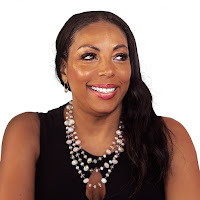 Dr. Katherine Hutchinson-Hayes is a review board member and contributor to Inkspirations (an online magazine for Christian writers), and her writing has been published in Guideposts. Her work in art/writing is distinguished by awards, including the New York Mayor’s Contribution to the Arts, Outstanding Resident Artist of Arizona, and the Foundations Awards at the Blue Ridge Mountains Christian Writer’s Conference (2016, 2019, 2021). She is a member of Word Weavers International and serves as an online chapter president and mentor. She belongs to FWA (Florida Writers Association), ACFW (American Christian Fiction Writers), CWoC (Crime Writers of Color),
Dr. Katherine Hutchinson-Hayes is a review board member and contributor to Inkspirations (an online magazine for Christian writers), and her writing has been published in Guideposts. Her work in art/writing is distinguished by awards, including the New York Mayor’s Contribution to the Arts, Outstanding Resident Artist of Arizona, and the Foundations Awards at the Blue Ridge Mountains Christian Writer’s Conference (2016, 2019, 2021). She is a member of Word Weavers International and serves as an online chapter president and mentor. She belongs to FWA (Florida Writers Association), ACFW (American Christian Fiction Writers), CWoC (Crime Writers of Color),AWSA (Advanced Writers and Speakers Association), and AASA (American Association of School Administrators). She serves on the nonprofit organization Submersion 14 board and the 540 Writer’s Community board and is an art instructor for the nonprofit organization Light for the Future. Katherine hosts the podcast Murder, Mystery & Mayhem Laced with Morality. She has authored a Christian Bible study for women and is currently working on the sequel to her first general market thriller novel. Her thriller A Fifth of the Story will debut in February 2024 through Endgame Press.
Katherine flourishes in developmental editing and coaching writers. She has a twenty-year career in education, leadership, and journalism. Katherine freelances as an educational consultant for charter schools, home school programs, and churches. In this role, she has written and edited curriculum, led program development, and helped manage growth facilitating and public relations.
She also works as an editor and book coach through her consulting business. Katherine provides skill, accountability, and professionalism so clients can begin, develop, and finish their writing projects for publication.
Published on January 15, 2024 22:00



